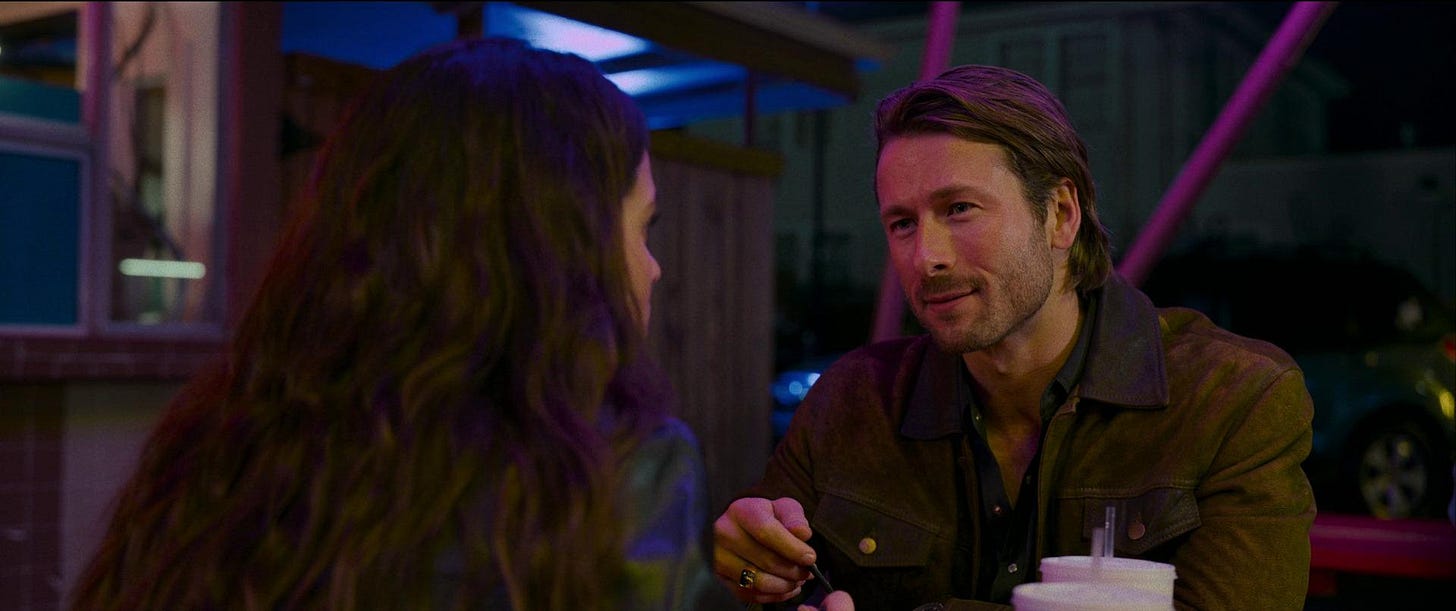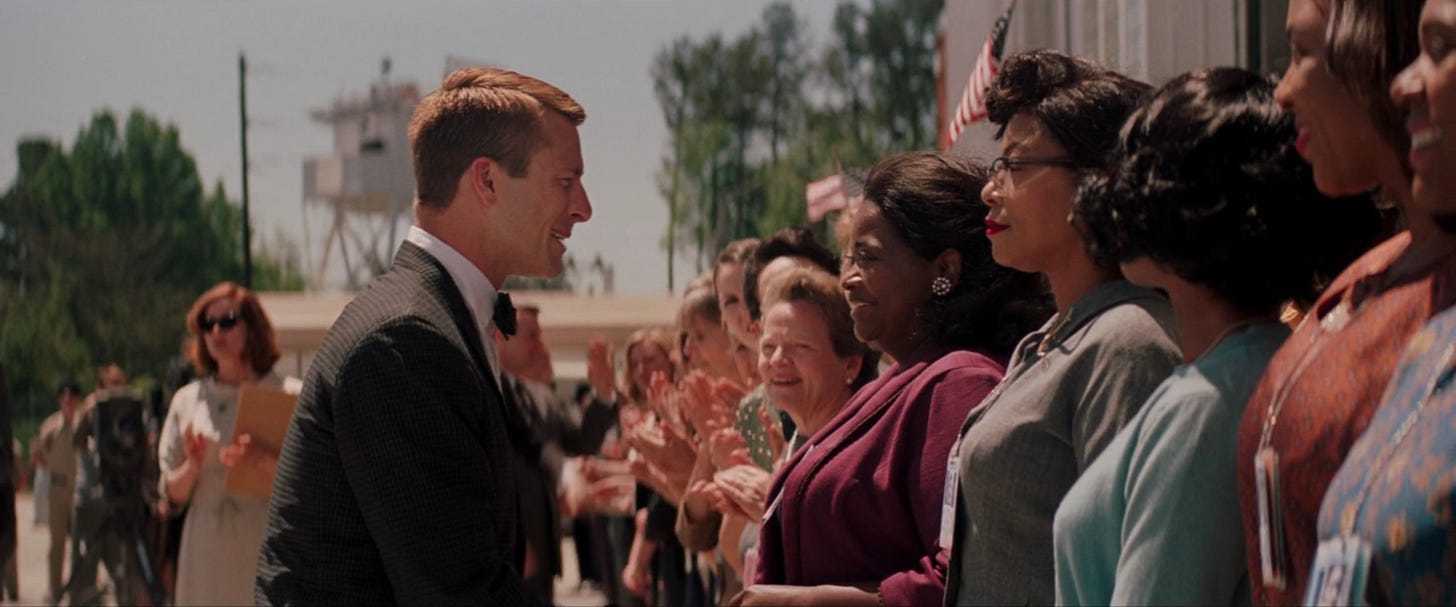Who is Glen Powell?
The Twisters (2024) Leading Man has been a Long-Gestating Project

I’d waited all night to tell a veritable stranger—whose name, had I known it, wouldn’t linger long enough for it to matter—something I’d noticed about him: a persistent itch that echoed around in my brain like a clarion call, demanding expression. We were in a mostly-empty, but loudly soundtracked, bar on the hottest night of the summer, and—as the extended friends-of-friends group we were both with pivoted to a different location in the complex—I sprung into action, fueled by margaritas, cornering the man en route: “Hey, sorry, has anybody ever told you that you look like Glen Powell?” I practically shouted at him into the din; not flirtatious, just probing.
“Who?” he asked with a ghostly approximation of that dimpled smile. He did look a little like him, after all, in the face. He needed to know that. So I told him. I gave him a laundry list of films. Then I retreated back into my own life, disappearing into the night like some deranged, sweat-soaked oracle who only tells you things that don’t matter. This is my life, I thought; this is my burden.
Frequently, I become fixated on movie stars: those screen performers with an intangible “it” factor that lights up a flat screen, elevating them to mythic status that ensures their legacy is passed down between generations. Developed during the “studio era” of Classic Hollywood, in which movie studios maintained totalizing control over actors’ lives, likeness, and projects, the concept has evolved over time as individual stardom has waxed and waned with the loss of studio control and ever-shifting cultural trends, including a push towards television, a medium once-thought of as a last resort for “real” stars. Even without the “fixers” of the studio era to sell the product, a “movie star” is still a concept we’re familiar with and trade on: a performer that pulls attention, no matter what’s happening around them—an embodiment of our own desired persona reflected back to us on the big screen, where distinctions of “I want to sleep with them” and “I want to be them” slip discursively. “She learned it alright; but, they didn't teach it in any class,” Tony Moss (Alan Rachins) notes of Nomi Malone (Elizabeth Berkley) in Showgirls (1995), while watching her dance with sexual aggression at an audition. You can tart up the performer to look the part, in other words, but you can’t teach someone that hunger.
Tom Cruise, that aging showgirl and champion of the theatrical moviegoing experience, was widely touted as “the last movie star” around the time that his Memorial Day-blockbuster, Top Gun: Maverick (2022), printed money, representing a resurgent Hollywood post-pandemic… a title that was challenged when his last blockbuster, Mission: Impossible – Dead Reckoning Part One (2023) failed to impress at the box office. In the past few years, media outlets have repeatedly posed the question: in the Age of Intellectual Property, are we facing the death of the movie star? In a world in which mid-budget films don’t even secure theatrical releases, how do we define a movie star: in box office success, or creative output? Cruise, a fastidious scholar of American popular culture (who has wisely concealed his Scientology in recent years as a bid to get back in the public’s good graces), clearly thinks the answer is something in-between, and has made it his personal crusade to educate the next generation. On the set of Top Gun: Maverick, Cruise sent co-star Glen Powell, his Pet Project, to an empty theater to watch a six-hour tutorial made by Cruise himself, breaking down everything he’d learned about making movies—and, I suspect, how to best showcase oneself in the movies. Whatever Powell learned in that theater, building off of his own years toiling as a struggling actor, he’s clearly taken it to heart: his recent performances are even more self-assured, full of expressive tics reminiscent of his idol.

In the 2010s, we had something of a cinematic epidemic on our hands: a dearth of rising male screen stars with sex appeal and screen presence. The “stars” being pushed by a greedy, increasingly IP-obsessed Hollywood were either juiced-up, sexless superheroes (eclipsed by their own IP) or charisma-challenged cases like Miles Teller, Jai Courtney, and Eddie Redmayne. Or worse: nepotism cases like Scott Eastwood and Ansel Elgort,1 whose only recommendation as screen performers seemingly came from being well-connected (and white) and not an intrinsic understanding of the demands of the medium. So many male actors of that era are what the commentators at cult gossip stalwart Oh No They Didn’t!—a (somehow) still-alive LiveJournal forum dedicated to celebrity gossip that’s a digital textbook for anyone serious about the nuances of fame management—deemed “potatoes,” owing to their pale, oblong faces and generally bland, replaceable quality. No one had sex appeal, despite their handsome faces; no one had it. Yet sometime before the pandemic (and onward into the new decade), that switch flipped, as a roster of exciting, non-potato male stars emerged onto the mainstage: Adam Driver, Timothée Chalamet, Daniel Kaluuya, Austin Butler, LaKeith Stanfield, etc… and suddenly, the question of male stardom was back on the table. Could there be movie stars in a precarious, remake-obsessed cultural moment defined by abstention and sexlessness?
Somewhere in the ether, a former child-star from Austin, Texas, who first cut his teeth in Robert Rodriguez’s Spy Kids 3-D: Game Over (2003), languished in small film roles, television work, and direct-to-streaming movies: Glen Powell. The actor first drew a modicum of attention for his self-assured performance in Ryan Murphy’s ill-fated, two-season Scream Queens (2015) and, later, Netflix’s well-liked rom-com Set it Up (2018), where he drew particular notice for his charisma and palpable chemistry with co-star Zoey Deutch. Around the time of the latter, he became a figure of discussion on cult gossip podcast Who Weekly?, which draws attention to Z-list celebrities and often serves as a Q-score starting ground for actors who work their way up from the bottom of obscurity.… a go-to resource for anyone serious about Hollywood and the fickle beast of celebrity. It’s why I consider knowledge of (and literacy around) Hollywood gossip so integral to film writing: a knowledge of the former has always helped inform the latter, particularly in considerations of star power. The projects that Powell first flourished in are—obviously—not highbrow works of art, and for many years it felt a bit maddening trying to explain that this guy is a star, he just hasn’t hit yet to people disinclined to watch material considered beneath them, which is practically everyone I know. “Who knew the pretty boy had such range?” a friend texted me, after watching this year’s Hit Man (2023), Richard Linklater’s ridiculously entertaining pseudo-crime caper comedy, which was unceremoniously dumped on Netflix after a week-long theatrical run that I was sure to take advantage of, missing the last great spring night in the city in payment. With all the condescending world-weariness that comes from having toiled in the trenches of popular entertainment, I simply texted back, “Oh, sweetheart.”

The Glen Powell Stardom Watch has been in motion for several years, since Set It Up (2018), culminating with his scene-stealing turn as “Hangman” in summer blockbuster Top Gun Maverick (2022), his biggest-profile role after his breakout turn in Richard Linklater’s superb Everybody Wants Some!! (2016) failed to turn heads. The role of Hangman was allegedly developed for Powell after the studio and/or Tom Cruise fell in love with him through the course of his auditions for the role of “Rooster,” eventually filled by Miles Teller, who disappears into the pulp and pomp of the film entirely. It’s maddening: why were they giving us a potato as a main dish, instead of filet mignon? Watching Top Gun: Maverick, I kept kicking Nicole, my seatmate, and a well-versed authority on male celebrity in her own right, every time he was on screen, elevating well-worn material and grinning that dimpled, kilowatt smile. Sure, the hair was tragic; but this guy… had something, right? When we later took in Powell’s romcom experiment Anyone But You (2023) with Hannah, whose standards are considerably more (and sometimes frustratingly) exacting when it comes to appreciation for the famous, male-presenting form, we conferred in our seats afterwards: “THAT is a movie star!” We all giggled and shook hands at once in a trilateral configuration with all the gravity of the Camp David Accords, glad that we could christen a new star with unanimous approval after years of divisive in-fighting over the subject. As far as we were concerned, this binding, trilateral decision was reality: now, it just meant that the official narrative needed to catch up.

Once more, as if in almost-unspoken ritual, we all convened last week for a daytime screening of Twisters (2024), a reimagining of Twister (1996)—with an “s” added for “sequel”—which would be Powell’s first true test as a leading man after last year’s Anyone But You “surprised” the industry by taking in $220 million worldwide. Turns out, Twisters is a mess, with an almost-cruel habit of teasing familiar Hollywood Beats without offering any return on investment: when Glen Powell’s character mentions that he was “looking for a dog” amidst the rubble of a tornado, you think surely, we are about to see Brisket, the adorable puppy that the actor adopted during the course of filming—and made a cornerstone of his well-conceived marketing of the movie. But there’s no Brisket, and there’s no kiss, epitomizing how far we’ve fallen in the manufacturing of Hollywood blockbusters.
It doesn’t matter that the movie is mid: once again, Powell’s film over-performed at the box office,2 and the film’s press cycle—thirst traps with Brisket; photo-ops with movie godfather Tom Cruise; trendy, brat-themed TikToks; a photo shoot standing on top of an overturned car in Times Square with the right hair, finally—long eclipsed the film itself, to the point that no one seems interested in engaging with it in earnest (the mark of a true Hollywood mid-budget blockbuster). Powell is so handsome, stepping out into the torrential rain while donning a cowboy hat; he’s so charming, treating his female meteorologist counterpart (Daisy Edgar Jones) with good-natured disdain and respect… isn’t that enough for us masses, beleaguered by offscreen life?
During the Great Depression, Warner Bros. conceived elaborate musical spectacles as an open excuse to allow hard-pressed filmgoers the chance to ogle the shapely legs of fleets of chorus girls; in the title track to Busby Berkeley-choreographed musical Dames (1934), a man self-referentially notes of the practice, “Who writes the words and music, for all the girly shows? No one cares, and no one knows.” Powell, like any dame worth her salt, lets us ogle, elevating the material in the process: in Anyone But You, he strips down completely to sell a (somewhat tired, but nevertheless committed) gag about a spider potentially hiding up his ass, a refreshing bit of gratuitous cheesecake, particularly considering co-star Sydney Sweeney (of Euphoria fame) routinely faces the grossest kind of objectification online due to being well-endowed. Sure, his body is a well-trained machine, but Powell’s confidence? That’s what’s hot.
The actor is (aggressively) executing a well-worn formula, cleverly deploying lessons both (probably) learned from Tom Cruise and clearly studied over the course of years as a working actor. His screen persona is a mixture of Texas “Good ‘Ol Boy” gumption, theater kid exuberance, and post-fourth-wave feminist sensibilities, making him a particularly seductive star for our fractured era: who can unite the disparate masses like a Southerner Who Treats Women Real Nice? And after years of men pretending to be above objectifying themselves, adopting faux-self-deprecating humor and marketing techniques to sell their slop, isn’t it nice to see someone who is trying to be a (real) movie star?
In honor of the talented Texan actor’s potential breakout moment, I’ve prepared a primer on his most-notable past work, mostly for my mother (and mother-in-law), to finally answer the question that’s plagued my steps for years now: just Who the Hell is Glen Powell?
Everybody Wants Some!! (2016)
Director: Richard Linklater

There's a lot to like in this "spiritual sequel" to Dazed and Confused (1993) from Texas filmmaker / baseball enthusiast Richard Linklater, which depicts a group of college baseball players at a Texas university in the fall of 1980. Like that prior film, the stakes are appealingly low, mostly content to cruise around with characters as they pursue beer and women (and sometimes play baseball). A talented cast with great chemistry lighten the proceedings for an easy, breezy weekend day watch, with Glen Powell as a true standout, wielding a charm missile offensive that hits every one of my targets. It seems obvious that Linklater saw in him something of a muse, and a kindred spirit: he is the handsome athlete with a desire to express himself creatively, beyond the confines of athletic achievement, which, in Texas, is totalizing. It’s a seductive formula for a burgeoning leading man and something that would help Powell stand out in a crowded field of contemporaries.
Everybody Wants Some!! (2016) is streaming on Amazon Prime and Paramount Plus.
Hidden Figures (2016)
Director: Theodore Melfi

Admittedly, I have not seen most of the non-Glen Powell scenes of Hidden Figures (2016), in which he plays John Glenn, the pioneering astronaut who became the first American man to orbit the Earth in 1962—ironic, because that’s the entire point of this film, which focuses on the boundary-breaking mathematicians who helped get his mug up there, making him the poster boy for American aeronautics. There’s a lesson to be learned there, for sure! The film stars Taraji P. Henson, Octavia Spencer, and Janelle Monáe as Katherine Goble Johnson, Mary Jackson, Dorothy Vaughan, respectively: three badass black female engineers and mathematicians who worked tirelessly to crunch the numbers that made space flight possible (orbital mechanics?? Fortran programming??)… from behind the scenes, proving that history happens in the margins. The film focuses on their triumph in the face of the racism and sexism they faced in the field—what Pauli Murray termed “Jane Crow,” the two-pronged force that subjugates black women in America—while Glen (Powell), as (John) Glenn, plays the more-famous figure as a humble, respectful young man, appreciative of his colleagues regardless of gender or race. Already, the “Glen Powell” archetype is taking shape: he’s a pretty boy who respects—even listens to!—women.
Hidden Figures (2016) is streaming on Disney Plus.
Set it Up (2018)
Director: Claire Scanlon

It’s a true existential question of our time: if a great romantic comedy is released on Netflix, did it even really happen? Online, the answer is yes, but out there in the real world, talking to my mother-in-law? No, it did not. With the elimination of mid-budget films, one of the hardest hit genres in Hollywood has been the romantic comedy—which seems to have all but gone the way of the big budget musical in the decades since we regularly could show up to the theater to see a lady with nice hair fall in love. There have been a few notable releases, despite this, including this genuinely charming yarn, one of the better things Netflix has put out. That's mostly thanks to the charisma of its two leads, Zoey Deutch and Glen Powell, two personal assistants who try to set up their tyrannical bosses (Lucy Liu and Taye Diggs... both delightful) to improve their work lives; slowly, they fall for each other as well. It's a cute, sweet watch, that's never received a traditional release, which always makes me nervous. As recent debacles at [HBO] Max have shown, streaming-exclusive releases will only result in lost films. Maybe that's where the romantic comedy goes from here: into the proverbial East River… but I hope not!
Set it Up (2018) is streaming on Netflix.
Top Gun: Maverick (2022)
Director: Joseph Kosinski

Just how integral is Glen Powell to Top Gun: Maverick (2022), sequel to Tony Scott’s iconic, homoerotic Top Gun (1986), which made Tom Cruise a household name? When we played the “Top Gun: Maverick VR experience” at the Atlantic Center Dave & Busters—an experience I DO NOT RECOMMEND if you, like me, get sick from steep drops into faux-canyons—it was Powell’s voice, as “Hangman,” encouraging us in our mission. In the massively successful film, he’s one of several pilots at the “Top Gun” school at NAS North Island, now overseen by “Iceman” (Val Kilmer), who brings former hotshot Maverick (Tom Cruise) back to prepare the students for a dangerous mission that can only be pulled off by human pilots; the school, and flying in the Navy in general, are teetering on obsolete, ready to be replaced by drones. Wisely, the film eschews any mention of foreign countries or geopolitical entanglements in its imagining of a mission necessitating the destruction of a “uranium enrichment plant,” ensuring that all Americans, regardless of their feelings on the military political complex, can sit back and take in the spectacle of dogfighting, exuberant piano playing, and the camaraderie of beach football. It’s a fun, dumb movie that makes up for its predictable beats with the energy of the cast involved. Powell, as the cocky, arrogant upstart, eclipses his co-stars, including Cruise himself—who has taken a more-reserved approach to screen performance as of late—smirking and ribbing and generally wedging his way into the film, taking full advantage of the opportunity afforded to him: the character was developed specifically to showcase Powell’s skills as a performer, clearly conceived as a sequel stand-in for Val Kilmer’s Iceman in the original film. Powell nails a role like this because he intrinsically understands that hypermasculine posturing of this sort demands a feeling of romance between lead/adversary, seducing us in the process. Even with bad hair.
Top Gun: Maverick (2022) is streaming on Amazon Prime and Paramount Plus.
Anyone But You (2023)
Director: Will Gluck

Having proven himself with Set it Up (2018), Powell got a chance to make a real romantic comedy—one released in theaters and advertised during major sporting events—with Anyone But You (2023), a delightful, low-stakes modern adaptation of Much Ado About Nothing opposite Euphoria star Sydney Sweeney, who has been successfully pivoting to film in recent years. The two deliberately played-up a possible onset cheating scandal, coinciding with Powell’s breakup with his longtime girlfriend Gigi Paris, which helped sell the film; it made bank at the box office, thanks to word-of-mouth and largely-female audiences, who flocked to see the two sexy, potentially involved stars encircle each other. “It’s a rom-com,” Sweeney later told the Los Angeles Times. “That’s what people want!” And she’s right: cheating accusations are Hollywood’s bread and butter (the audience must see for themselves whether these stars have incriminating sexual chemistry) and modern Shakespearean adaptations used to be a solid microgenre all its own… nowadays, it’s a different beast. The movie’s marketing didn’t even mention that it was an adaptation of Much Ado About Nothing, making the already murky story incredibly confusing in trailers and advertisements. In the film, the two play former one night stands who turn against one another—only to reconnect at a wedding between a family member and friend, amusingly set in Australia; to stop everyone’s meddling, they pretend to be together… only to fall in love in the process! It’s not reinventing the wheel (it’s literally Shakespeare), but it’s a great, fun little film, particularly in how it pays tribute to its genre forbearers (particularly in the casting of RomCom Royalty Rachel Griffiths and Dermot Mulroney as Sweeney’s parents). Powell and Sweeney’s chemistry is palpable, and they’re both wearing so very little, smoothing over some of the more-awkward beats of the script and familiar denouement of the story, as well as Powell’s still-not-right haircut.
Anyone But You (2023) is streaming on Netflix.
Hit Man (2023)
Director: Richard Linklater

The prodigal son returns home—finally sporting good hair!—with Hit Man (2023), a terrific crime thriller / romance hybrid that sees the now-established leading man reunite with his maestro, Richard Linklater, to tell the fictionalized story of a real-life fake hitman Gary Johnson, a college professor who worked with the Houston police department to set up stings for people soliciting contract killings in the 80s and 90s. After drawing acclaim at Venice and TIFF in 2023, the film was snatched up by Netflix, that Great Villain of Cinema, who dumped it on their service in June after a one-week theatrical run. What could have been a well-timed, well-received feather in Powell’s cap, coinciding with the success of Twisters, became a streaming service release aimed at People In the Know; I can say this with absolute authority, because the film killed in my theatrical screening, offering a tantalizing glimpse of what might have been. Funny, sexy, and smart, the film imagines an ersatz hitman who falls for one of his marks (Puerto Rican actress Adria Arjona, in a breakout turn), then must decide how to reconcile his feelings with his professional obligations. As part of his character’s artifice, Powell cycles through a roster of “fake” hitman personas, affecting a wide range of characters while donning increasingly questionable wigs. One of those characterizations includes a suspiciously faithful Matthew McConaughey impression, a tribute to his fellow famous Texan (and Linklater graduate) and a clue as to where Powell could go from here. Because of their association, everyone compares Powell to Tom Cruise, whose fame—and infamy—will (probably) never be recreated, but what if he could occupy a role similar to McConaughey in today’s film culture? Well-liked on and offscreen; powerful and imposing; a Texas boy with deceptive good looks and a penchant for weirdness bubbling just under the surface. Even the potential for darkness and vague sense of duplicitousness is there: this movie just barely hints at it.
Hit Man (2023) is streaming on Netflix.
If Powell can continue to secure solid material—and work with filmmakers who truly know how to utilize him, like Linklater—he might just graduate to the level of stardom he’s so clearly after as a performer, provided he doesn’t fall victim to a collapsing industry. With Twisters a certifiable hit, maybe the narrative is finally catching up, giving him the final industry boost he needs to make a real classic film. At the very least, I hope his recent success is helping that look-alike stranger at the bar get laid.
I do not care that the actor attended LaGuardia High School: the man can’t act, he can’t sing, and he can’t dance (a triple threat). The school should have given his parents—Arthur Elgort, Vogue photographer, and Grethe Barrett Holby, a celebrated figure within the opera world—their money back.







